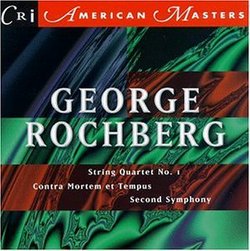| All Artists: Rochberg, Concord Quartet, Nyp, Torkanowsky Title: Works 1 Members Wishing: 0 Total Copies: 0 Label: Composers Recordings Release Date: 9/16/1997 Album Type: Import Genre: Classical Styles: Chamber Music, Historical Periods, Modern, 20th, & 21st Century, Symphonies Number of Discs: 1 SwapaCD Credits: 1 UPC: 090438076821 |
Search - Rochberg, Concord Quartet, Nyp :: Works 1
 | Rochberg, Concord Quartet, Nyp Works 1 Genre: Classical
|
Larger Image |
CD Details |
CD ReviewsAccessible modern Paul Geffen | 03/01/2001 (4 out of 5 stars) "Serialist compositions have an abstract expressionist character that makes them seem cold, dry, forbidding, and even arbitrary. This is an inevitable result of the style and the system employed in their creation, which leans heavily to the intellectual and systematic. It is also why this style is so effective and appropriate to the twentieth century - these feelings are the essence of the spirit of the times. George Rochberg is one of the most successful of the serialists. He has demonstrated both a thorough understanding and mastery of the system in his early works, and the ability to transcend the limitations of the form when they no longer served his artistic goals. Rochberg's lyrical sense allowed him to express a broader than usual range of feeling within the constraints imposed by the serialist method, but he ultimately had to leave the method behind as too restrictive. The opening bars of the earliest work on this disc, the String Quartet #1, could easily be mistaken for those of a late Romantic slow movement. (It's as if Mahler had tried to write chamber music.) It gradually descends into dissonance through a seemingly logical progression, and then builds into an energetic statement of purpose. Rochberg's Symphony #2 opens with martial alarms, staccato trumpets and drum tattoo. Written in the heat of the cold war, the aggressive attitude gradually breaks apart and becomes playful. New melodic elements are introduced and the music is gradually transformed (as perhaps the composer hopes the world will be). The opening material recurs but feels less ominous and threatening in the later context provided for it. There is no doubt that that second movement is meant to be a scherzo - a joke. It tries very hard to be funny but it is not humorous; it is a serious effort to grab your attention. The third movement, "molto tranquillo," brings some lyricism but sounds thin, as the restrictions of the tone row do not allow deep harmonies to be formed. Dissonance is avoided here at the cost of limiting the number of voices. The moods expressed by the Symphony all seem to revolve around alienation. The piece holds together very well and the last movement brings together many of the diverse elements and feelings developed in the rest of the piece. Here, fast and slow elements are juxtaposed, with contrasts between heavy and light. The piece ends on a quiet note and seems somehow inconclusive. The last piece (chronologically) is the elegiac Contra Mortem et Tempus, written after the death of Rochberg's son in 1964. The work is an "assemblage" with (so say the notes) quotes from Boulez, Ives, Varese, and Rochberg's own works. It is, like the other works here, a study in contrasts with long notes from the flute or violin held against short notes from the percussion (the piano) which also supplies the element of rage with occasional violent outbursts. The quieter lines give the piece an ominous, spooky character, as do the flutter-tongue accents and those passages where the pianist strikes or strums the strings with the hands. Towards the middle of the piece the winds play fast rising motifs which suggest flowers popping out of the ground, or birds. At the end, the pianist half-sings, half-whispers the title of the work into the piano, bringing things to a solemn close. Although Rochberg has always been well known among his peers and the cognoscenti, the small number of generally available recordings has limited his exposure to the general public. Until recently, not one of his symphonies or string quartets had been released on compact disc. Composers Recordings must be praised for bringing these works back into wider circulation. This is the first of two discs of Rochberg from this label. (The second has the String Quartet #2 and other chamber works.) The last four quartets are now available on CD from New World Records." A *GREAT* American symphony 07/31/2000 (5 out of 5 stars) "This CD contains some of Rochberg's early works: i.e. before he turned retro. The two chamber works are interesting, but the grand prize here is the Symphony #2, one of the few great American symphonies of the now nearly defunct 20th century. The New York Philharmonic, plays brilliantly under Werner Torkanowsky, hitting a grand slam in what seems to have been his only time at bat in the majors.The symphony is strong and colorful, brimming with muscularity and self-confidence. One wonders what Rochberg would have produced had he not turned onto the path of neo-romanticism."
|

 Track Listings (9) - Disc #1
Track Listings (9) - Disc #1